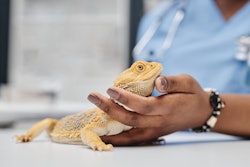
Obesity-related health problems outweigh the dangers of malnutrition and starvation for dogs and cats in many nations, including the United States. In a 2022 survey by the Association for Pet Obesity (APOP), veterinarians observed that 61% of evaluated cats and 59% of dogs were overweight or obese. In response to the ongoing obesity epidemic in companion animals, pet food manufacturers have developed various weight-control pet foods. At the same time, awareness of gut health and the importance of probiotics has risen. Scientists found evidence that probiotics may help dog owners manage their pets’ weight. Scientists explored the effects of two probiotics, Enterococcus faecium IDCC 2102 and Bifidobacterium lactis IDCC 4301, on dogs eating a high fat diet.
“These probiotics enhanced systemic energy utilization in response to high caloric intake, thereby preventing lipid accumulation and restoring stability to the fecal microbiota,” the researchers wrote in the journal Veterinary Microbiology. “Consequently, this intervention resulted in a reduction in systemic inflammation caused by the high-fat diet.”
Probiotics and pet dog obesity
Probiotics, live beneficial bacteria, are popular for their role in maintaining gut health in both humans and pets. This study, conducted in South Korea, focused on their impact on metabolic health. Seoul National University, Kyungpook National University and Chungnam National University researchers explored how these probiotics might alleviate obesity-related issues in canines consuming high-fat diets. The research demonstrated that both E. faecium IDCC 2102 and B. lactis IDCC 4301 can significantly reduce weight gain and lipid accumulation in dogs fed high-calorie diets.
The study delved into the biological mechanisms of these probiotics, revealing notable effects on systemic inflammation, lipid metabolism, and hormone regulation:
- Modifying Gut Microbiota: Both IDCC 2102 and IDCC 4301 were found to positively alter the gut microbiota by promoting beneficial bacteria such as Lactobacillaceae, Ruminococcaceae, and S24-7. This change was accompanied by reduced levels of pro-inflammatory bacteria typically associated with high-fat diets.
- Enhancing Energy Utilization: The probiotics facilitated pyruvate metabolism, aiding glucose regulation and increasing ATP production. B. lactis IDCC 4301, in particular, contributed to higher levels of bacterial short-chain fatty acids, which are essential for efficient energy production and utilization.
- Influencing Neurotransmitter Production: E. faecium IDCC 2102 was found to boost dopamine synthesis, potentially restoring normal eating behaviors in dogs. This is significant as disrupted dopamine signaling has been linked to pathological eating and glucose intolerance in obese animals.
Implications for weight-control pet products
By enhancing energy utilization, regulating gut bacteria, and improving neurotransmitter balance, these probiotics represent a promising tool in addressing obesity-related health issues in pets. As demand for functional ingredients grows within the pet food market, the integration of targeted probiotics offers potential for both improved pet health and commercial growth.
While the results are promising, the study authors highlighted the need for further investigation into the broader applications of these probiotics in managing metabolic diseases across different species. The intricate interactions between gut microbiota, metabolic pathways and neurobiological factors suggest that these probiotics may have multifaceted benefits that extend beyond weight management.
As the pet food industry continues to focus on improving health outcomes, incorporating probiotics may offer innovative solutions for weight management in companion animals. However, to fully harness their potential, additional metagenomic and metabolomic studies will be necessary to better understand their mechanisms and impacts on animal health.
















